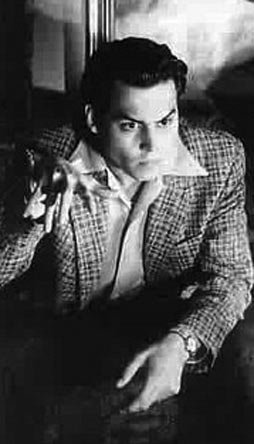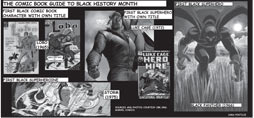By Chris Webb/nw news editor
ANDREW HILL
“I’m obsessed,” Andrew Hill, a South Campus student, said, referring to the upcoming presidential election.
The 20-year-old full-time student is a political science major.
Hill, a Democrat, likes both Barack Obama and Hillary Clinton.
“I’ll probably vote for Hillary Clinton in the primary. I don’t know if she’ll win but it’s a principle thing,” he said. “I have a lot of respect for her.”
Hill said Clinton gets a bad reputation just because of her name. However, he respects her because of her public service background and her stance on most issues, such as foreign relations and healthcare.
His biggest concern when deciding on a candidate, and his biggest concern in the election, is “repairing our image with the rest of the world.”
Hill believes both Clinton and Obama can do a good job at that.
“Healthcare is the second,” he said.
He agrees with Hillary’s universal healthcare plan.
Hill has been keeping up with the candidates and the election by watching the news and reading political blogs, though he doesn’t have one himself.
His fundamental belief in the Democratic (rather than Republican) way of thinking could be traced back to his immediate family.
“My parents are both Democrats, but my extended family are all conservatives and Christians,” he said.
Though Hill said he does consider himself a fairly religious person, he doesn’t think politics and religion should mix.
“I dislike a political party dictating moral standards like the Republican do,” he said. “[I’m a Democrat because] I like the idea of helping people and not discriminating against sexual orientation, for example.”
This will be the first presidential election in which Hill can vote, though he did vote in last year’s gubernatorial race.
His hopes for America’s future seem simple.
“[I want] a nation at peace with the rest of the world and at peace with itself,” he said.
One hesitation Hill still has about Clinton is that so many people dislike her.
“Our nation still might be divided,” he said.
— Julissa Treviño
FELICIA FISK-BLACKWELL
Before going to the polls, people should consider many things when voting for a particular candidate such as political party affiliation or a candidate’s stance on issues like gay marriage and abortion.
Felicia Fisk-Blackwell, a NE Campus student, already knows where she stands politically.
“I don’t really have a certain ‘affiliation.’ Being a Baptist, most people assume I’m a Conservative Republican. I do lean that way most of the time, but I base my decisions and views on where each candidate stands on certain issues.”
Because of Fisk-Blackwell’s mostly conservative beliefs, she has decided to vote Republican in the upcoming election.
“I am voting for Huckabee. I really admire his perseverance when confronted by other Republicans to drop out of the election,” she said. “I like that he is very straightforward—he doesn’t sugarcoat things.”
Even though she is confident about whom she will be voting for, Fisk-Blackwell hopes some of her bigger concerns will be taken care of no matter who becomes the next president.
“My biggest concern is the war. Not pulling the troops out of Iraq, but the fact that the media is only showing the bad stuff that is happening,” she said. “That needs to change. We need a leader who is going to change the way people are given their information.”
Because Fisk-Blackwell thinks the media sensationalizes everything, it does not influence her political opinion. She is also not influenced by her family because her parents seldom vote in elections.
“I told myself I wasn’t going to let anyone influence me, so I did research on my own,” she said. “I studied up on every candidate and where they stood studied … the issues that are important to me. I made my decision after hearing their speeches.”
Regardless of who becomes the country’s new leader, she hopes the next president will do whatever he or she can to make the United States a better place.
“I hope that one day we can actually be a united country. I think that so many people have so many opinions that we are scared to voice them and back them up,” she said. “Also, I hope in the future America will become a nation of people who know what they believe in and stand for, why they do so and how they are going to try and better our country through that.”
— Rylie Parkins
MOHAMMED NAFIZ BHUIYAN
While some voters still remain relatively undecided about whom they are going to cast their ballot for in the upcoming presidential primary, one local college student thinks the answer is easy—the next president of the United States needs to be as culturally diverse as the people he or she governs.
“ The tone of this country needs to be changed. People need to know that America is a diverse country and Americans are not the bad guys,” Mohammed Nafiz Bhuiyan, SE Campus student, said.
Diversity—coupled with his message of “yes, we can” while wearing the badge of “change”— is what makes Barack Obama so appealing, Bhuiyan said.
Bhuiyan was born in Bangladesh and, when in high school, decided to move to the U.S. for the educational opportunities. However, he felt discouraged after he read a survey last year that said 44 percent of Americans would not want a Muslim as a neighbor.
“We live in a world of social and racial injustice,” he said. “People are not born racist; prejudice is something that is learned.”
As a youth, Obama spent many years living in Southeast Asian countries among Muslims—a group that continues to be the focus of much U.S. foreign policy. And assuming Obama does go on to win the presidency, Bhuiyan said the Democratic front-runner’s upbringing would play a large role in helping unite an otherwise divided nation.
But Bhuiyan has not always leaned toward a Democratic affiliation. In fact, had he been able to vote in the last election, he said he probably would have voted for a Republican. “I felt like they did a good job defending our country,” he said.
But other than the original invasion, he said international favor would continue to be lost so long as the U.S. occupies Iraq.
Bhuiyan said he worked hard to make the move to the U.S. But he is having trouble reconciling that hard work with the American dream—something he thinks, as a Muslim, is shattered at the airport during security checks.
“Things that happened on Sept. 11, 2001, were horrifically sad,” he said, “and Muslims all over the world felt like their religion was hijacked. I felt like my religion was hijacked—and those hijackers were not Muslim because they bow to the gods of hatred.”
— Mark Bauer
MARTIN FRITZ
After much controversy and numerous unpopular decisions in the White House many of America’s youth desire change, but some still don’t see the value in one person’s vote.
“Our generation needs more motivation,” Martin Fritz, a student on NW Campus and president of the Students for Law and Politics club, said. “I don’t know who has been telling people their vote doesn’t matter, but it’s become the mentality of the common voter, and that’s exactly what SLAP aims to change.”
Fritz is a Republican and a long-time political junkie who views John McCain as a source of change.
“I hope we can restore some of our nation’s dignity in world politics, and I think McCain can do that,” he said.
Fritz doesn’t agree with McCain on every issue, but believes McCain’s character makes him the best qualified among candidates.
“You need to vote for the person you think will really make this country better,” he said. “Find somebody that you can agree with most of the time and will do the right thing for the country.”
A candidate’s character is important, but the issues shouldn’t be left out of the equation. Fritz says the major issues this time around are the economy, specifically the housing market, and the war in Iraq. “If the Iraq war wasn’t an issue, I would consider voting for a Democrat. But it is, and that is another reason why I am voting for McCain; he will end it,” he said.
Corruption on Capitol Hill has been prevalent lately and even the most patriotic have become weary of some of our nation’s leaders.
“My biggest concern is that some politicians are power hungry, and many don’t see beyond themselves to the bigger picture,” he said.
Fritz, a music education major, spends much of his spare time playing piano and composing music. His interest in music largely stems from his parents, not unlike his interest in politics.
“My family first introduced me to politics. Both my parents lean toward the conservative end and some of that is reflected in my views,” Fritz said. ‘The elections aren’t some silly popularity contest; they decide who will run our country for the next four years. I can see a number of futures for our country, but which future we end up in is up to us.”

























